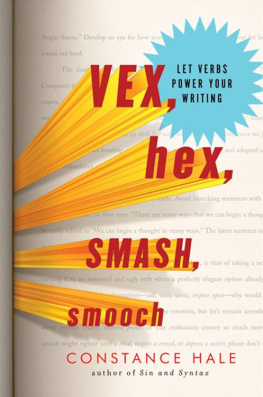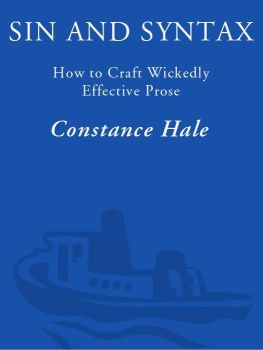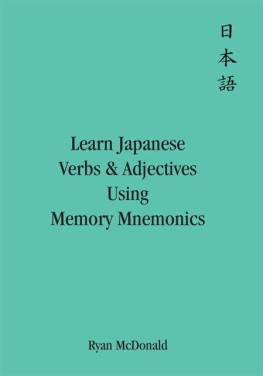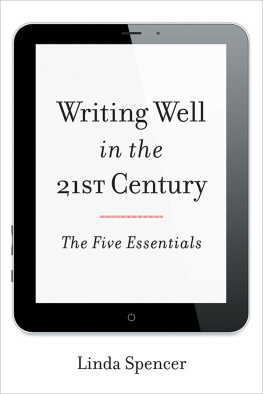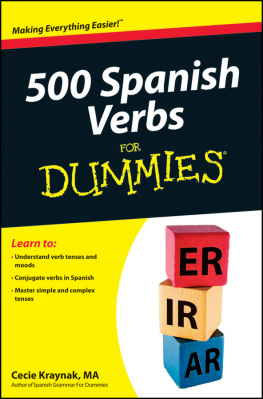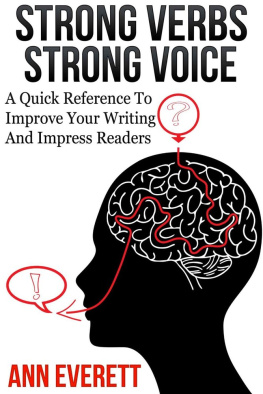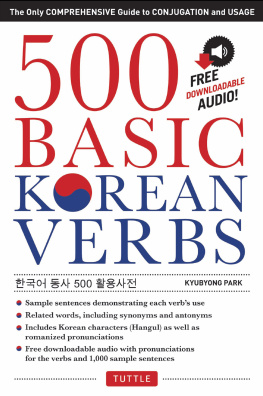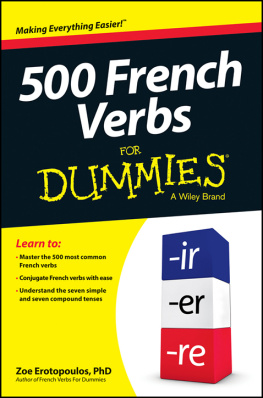Also by Constance Hale
Sin and Syntax
Wired Style
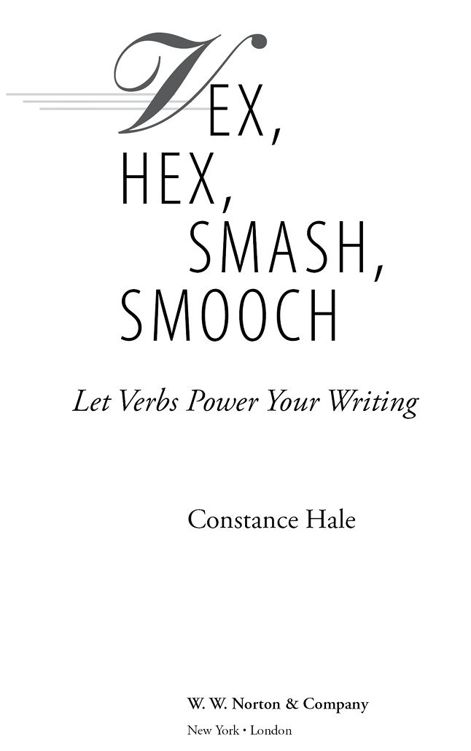
In memory of
Wendy Lipkind,
my longtime friend
and champion
CONTENTS
INTRODUCTION
The Power and
Pizzazz of Verbs
C aesar got them. Saint Matthew got them. Hamlet got them. Saul Bellow got them. Even my dog Homer got them.
Got what?
Verbs.
Vital, vibrant, voluptuous, and, yes, sometimes vexing verbs.
Julius Caesar, after his short war with Pharnaces II of Pontus, proclaimed veni, vidi, vici : I came , I saw , I conquered .
Saint Matthew, when he got the chance to record his gospel of the New Testament, reminded us, And the rain descended , and the floods came , and the winds blew , and beat upon that house; and it fell not.
Shakespeares Prince of Denmark did a lot more than contemplate what it meant to be or not to be . When he considered the paradox of existence, he relied on a full palette of verbs: Is it nobler in the mind to suffer the slings and arrows of outrageous fortune, he asks, Or to take arms against a sea of troubles, and, by opposing , end them? Then again, he muses, maybe its better to die, to sleep no more, and to end the heartache and the thousand natural shocks that flesh is heir to. Finally he asks yet another existential question: In that sleep of death what dreams may come when we have shuffled off this mortal coil?
Saul Bellow, in his novella Seize the Day , saw in every face in New York the refinement of one particular motive or essence I labor, I spend, I strive, I design, I love, I cling, I uphold, I give way, I envy, I long, I scorn, I die, I hide, I want. He wasnt the firstor the lastto define people by the things they do .
And my dog? Well, youd better believe that Homer understood the commands sit , stay , heel , and fetch . (He wasnt so good on lie down .)
Each of these figures (or in the case of Hamlet, Shakespeare standing behind him) understands the peculiar power of verbs. And all serious writers know that verbs act as the pivot point of every sentence. Verbs put action in scenes, show eccentricity in characters, and convey drama in plots. They give poetry its urgency. They make quotes memorable and ads convincing.
For centuries, schoolteachers have praised these action words. In the last few decades, the hipper Schoolhouse Rock! called them whats happenin. Karen Elizabeth Gordon, the author of subversive grammar handbooks, calls them the heartbeat of a sentence. Architect and futurist Buckminster Fuller went so far as to compare verbs to the Almighty: God, to me, it seems, is a verb, not a noun, proper or improper.
W hether or not you consider them close to God, verbs run deep in our DNA. Literally. (The human version of the FOXP2 gene gives us our capacity for speech and therefore for verbs.)
Verbs run deep in the DNA of our every sentence, too. One cannot sort out the roles in a sentence without looking up the verb, writes Steven Pinker in The Language Instinct . He continues: Verbs have the power to dictate how a sentence conveys who did what to whom. The verb determines the roles, or designated positions, of all the other words in the sentence. The subject may make like the monarch of the sentence, but the verb actually bosses the subject around, and can give a noun many other jobs. In fact, Pinker calls the verb a little despot that dictates everything that goes on in a sentence.
But verbs do more than just dominate sentences. Ask a cop whether hed prefer to know the color of a suspects sweatshirt, or the way he walked and talked. Ask a neuroscientist about how action lights up the mirror neurons in our brains. (These nerve cells fire both when we act and when we see someone else performing the same action. They also fire if we remember or describe the deed.) Ask a theater director whether she would prefer an actor who emotes or one who expresses feelings through physical actions. (I once brought carrots and a vegetable peeler to a rehearsal when an acting teacher told us to keep busy while saying our lines; my savage attack on that poor root said more about anger than any snippets of dialogue.)
Or watch a baby turn coos and babble into coherent speech. Fully 20 percent of the words babies master by age two describe actions. Some of those words might not be, technically, verbssuch as the command Up!but surely some of the first things we grasp, if preverbally, are eat, drink , and if not exactly be merry , at least smile and be cuddled.
T he verb in English enjoys a special primacy. Linguists tell us that verbs make up one of our four major word classes, along with nouns, adjectives, and adverbs. Whats cool about these content words (as opposed to lowly function words like pronouns and prepositions) is that their ranks keep growing, making the language ever richer. We get more and more verbs every year!
How many exactly? Lexicographers differ in their answers, depending on whether they are strict or loosey-goosey. But most reputable English dictionaries list between 315,000 and 600,000 words total, about a seventh of them verbs. So were talking somewhere between 45,000 and 85,000 little despots, from abacinate ( to blind by placing hot irons, or metal plates, in front of the eyes ) to zoon (to move quickly, making a buzzing sound). Those both come from the Oxford English Dictionary online, which tells us that swear is the oldest English verb (dating from around AD 688). And the newest? Take your pick: astroturfing , autosave , couchsurf , debone , and geotagging are all recent additions.
Of course, numbers dont mean power (just ask Al Gore). Pick a sentence, any sentence, and youll see that the verb makes the damn thing tick. It turns a noun into a subject, a subject into the beginning of a sentence, a sentence into the beginning of a story. The combination of a noun and a verb is the essence of sentencehood: Mona weeps. The searchlight sweeps. Harvey keeps on keeping on.
It isnt the same in all languages. Arabic doesnt have an equivalent to our infinitive to be , for example, so nouns are placed right next to adjectives, with the prefix al- indicating definiteness. Al-taaliba al-latifa means the polite student, while Al-taaliba latifa suffices to say The student is polite.
Some languages dont even separate verbs and nouns as classes, relying instead on prefixes or suffixes to tell them apart. In Hawaii, your vocabulary will swell like a wave at Sunset Beach if you learn to place the marker hoo in front of a noun or adjective: Ikaika means strong, and hooikaika to make strong or work out at a gym. Uka means the uplands; hoouka means to put that surfboard on the top of the jeep and head out to the Pipeline for a day of surfing.
Then theres the Straits Salish language from the far northwest regions of North America. Rather than having distinct classes of nouns and verbs, its word roots might encompass events, entities, and qualities. The root poxt means the state of being a father, and it can be altered by prefixes, suffixes, and clitics to mean things like He is your father or Be a father! (The meaning of a word also changes based on the surrounding words in the sentence.)
But back to English. Not only do we depend on verbs, using them in every sentence we utter, but we twist them into myriad tenses and moods that allow us to be precise about time and nuanced about intention. We can say that today we do the macarena, and that in eighth-grade dancing class we foxtrotted , and that we girls had waltzed with our doting fathers before we dared do it with boys. Unless, of course, we are planning our next trip to Buenos Aires; then we say We will tango . Or fantasizing, in which case we might say, I wish I were tangoing right now.
Next page
